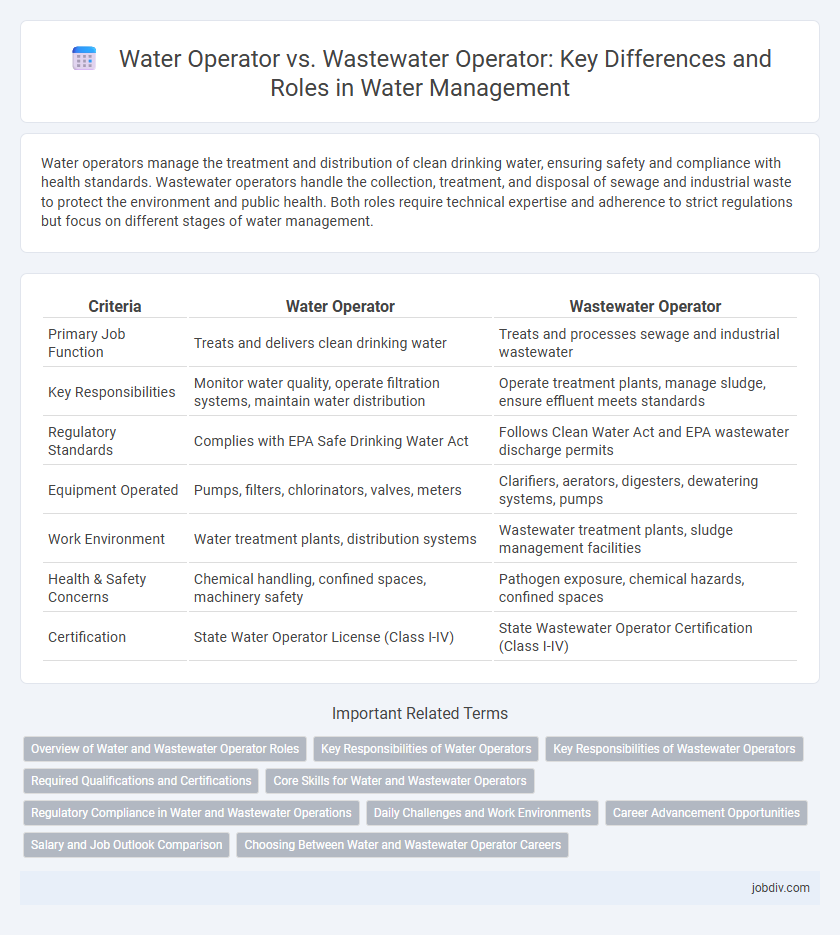Water operators manage the treatment and distribution of clean drinking water, ensuring safety and compliance with health standards. Wastewater operators handle the collection, treatment, and disposal of sewage and industrial waste to protect the environment and public health. Both roles require technical expertise and adherence to strict regulations but focus on different stages of water management.
Table of Comparison
| Criteria | Water Operator | Wastewater Operator |
|---|---|---|
| Primary Job Function | Treats and delivers clean drinking water | Treats and processes sewage and industrial wastewater |
| Key Responsibilities | Monitor water quality, operate filtration systems, maintain water distribution | Operate treatment plants, manage sludge, ensure effluent meets standards |
| Regulatory Standards | Complies with EPA Safe Drinking Water Act | Follows Clean Water Act and EPA wastewater discharge permits |
| Equipment Operated | Pumps, filters, chlorinators, valves, meters | Clarifiers, aerators, digesters, dewatering systems, pumps |
| Work Environment | Water treatment plants, distribution systems | Wastewater treatment plants, sludge management facilities |
| Health & Safety Concerns | Chemical handling, confined spaces, machinery safety | Pathogen exposure, chemical hazards, confined spaces |
| Certification | State Water Operator License (Class I-IV) | State Wastewater Operator Certification (Class I-IV) |
Overview of Water and Wastewater Operator Roles
Water operators monitor and control water treatment processes to ensure safe, clean drinking water by managing filtration, disinfection, and distribution systems. Wastewater operators handle the collection, treatment, and disposal of sewage and industrial waste, focusing on removing contaminants to protect environmental and public health. Both roles require knowledge of regulatory standards, equipment operation, sample testing, and system maintenance to maintain water quality and compliance.
Key Responsibilities of Water Operators
Water operators manage the treatment and distribution of clean drinking water, ensuring regulatory compliance and maintaining water quality standards. Their key responsibilities include monitoring water treatment processes, operating pumps and filtration systems, and conducting routine maintenance to prevent system failures. They also perform water quality tests, maintain accurate records, and respond promptly to system alarms or customer concerns to guarantee safe and reliable water supply.
Key Responsibilities of Wastewater Operators
Wastewater operators are responsible for managing the treatment processes that remove contaminants from sewage and industrial effluents to ensure compliance with environmental regulations. Their key duties include monitoring treatment systems, performing routine laboratory tests to analyze water quality parameters, and maintaining equipment to prevent failures. They also document operational data and respond to emergencies such as system malfunctions or hazardous discharge incidents.
Required Qualifications and Certifications
Water operators typically require certifications such as the Certified Water Treatment Plant Operator (CWTPO) credential, emphasizing skills in potable water treatment and distribution system management. Wastewater operators must obtain certifications like the Certified Wastewater Treatment Operator (CWTO), focusing on sewage treatment processes, effluent quality standards, and environmental regulations compliance. Both roles demand rigorous training, state-specific licensing, and knowledge of water quality analysis, safety protocols, and regulatory frameworks governed by agencies like the EPA and state environmental departments.
Core Skills for Water and Wastewater Operators
Water operators specialize in managing treatment processes to ensure safe, potable water by monitoring filtration, disinfection, and distribution systems with strong knowledge of chemical dosing and regulatory compliance. Wastewater operators focus on the treatment and disposal of sewage and industrial waste, requiring expertise in biological nutrient removal, sludge handling, and environmental regulations to protect ecosystems. Both roles demand proficiency in equipment operation, water quality analysis, and emergency response to maintain public health and regulatory standards.
Regulatory Compliance in Water and Wastewater Operations
Water operators ensure regulatory compliance by maintaining safe drinking water standards under the Safe Drinking Water Act (SDWA), conducting routine testing for contaminants, and managing treatment processes to meet EPA guidelines. Wastewater operators focus on adhering to the Clean Water Act (CWA) by treating and discharging wastewater within permitted limits, monitoring effluent quality, and preventing environmental pollution through proper sludge management. Both roles require detailed record-keeping and reporting to state and federal agencies to demonstrate compliance and avoid penalties.
Daily Challenges and Work Environments
Water Operators manage potable water systems, ensuring safe drinking water by monitoring treatment processes, pressure levels, and system integrity, often working in outdoor environments and facing challenges like seasonal fluctuations and contamination risks. Wastewater Operators handle sewage treatment facilities, focusing on pollutant removal, sludge management, and regulatory compliance, often operating in confined spaces with exposure to odors and hazardous materials. Both roles require constant vigilance, technical expertise, and adapting to emergency repairs or equipment failures to maintain public health and environmental safety.
Career Advancement Opportunities
Water operators manage the treatment and distribution of potable water, ensuring compliance with health regulations and system efficiency. Wastewater operators specialize in the treatment and disposal of sewage, focusing on environmental protection and regulatory adherence. Career advancement in water operations often leads to supervisory roles, technical specialist positions, or regulatory compliance management, while wastewater operators can progress to environmental engineering, plant management, or compliance and safety leadership roles.
Salary and Job Outlook Comparison
Water operators earn an average annual salary of $45,000 to $65,000, reflecting steady demand in municipal water treatment and supply industries. Wastewater operators typically have similar salary ranges but may see higher pay in regions with aging infrastructure requiring advanced treatment skills. Job outlook for both roles is positive, with the U.S. Bureau of Labor Statistics projecting a 5% growth rate driven by increased environmental regulations and infrastructure investments.
Choosing Between Water and Wastewater Operator Careers
Choosing between water operator and wastewater operator careers depends on your interest in water supply or water treatment processes. Water operators focus on ensuring safe drinking water through monitoring, filtration, and distribution systems, while wastewater operators specialize in treating and managing sewage and industrial waste to protect environmental health. Both careers require certification and offer stable job prospects with opportunities to impact public health and sustainability.
Water Operator vs Wastewater Operator Infographic

 jobdiv.com
jobdiv.com